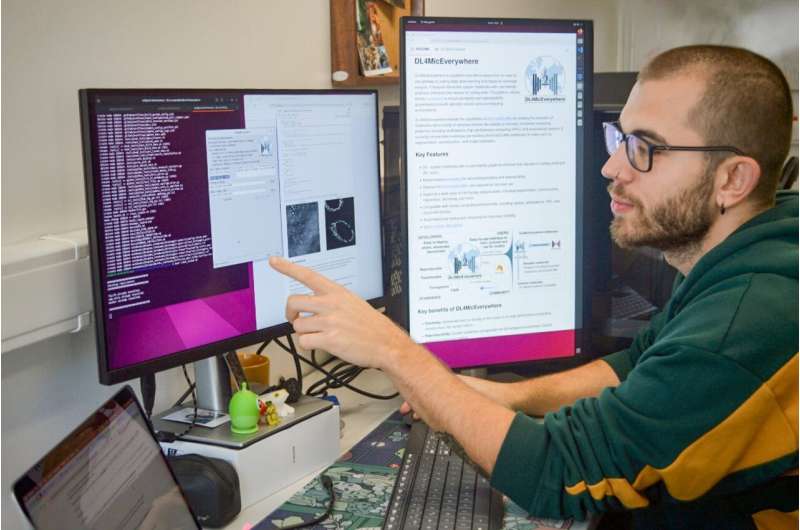This article has been reviewed according to Science X's editorial process and policies. Editors have highlighted the following attributes while ensuring the content's credibility:
fact-checked
peer-reviewed publication
trusted source
proofread
Researchers in Portugal develop an image analysis AI platform to boost worldwide research

A team of researchers from the Instituto Gulbenkian de Ciência (IGC) in Portugal, together with Åbo Akademi University in Finland, the AI4Life consortium, and other collaborators, have developed an innovative open-source platform called DL4MicEverywhere. The paper, "DL4MicEverywhere: Deep learning for microscopy made flexible, shareable, and reproducible," was published in the journal Nature Methods.
This platform provides life scientists with easy access to advanced artificial intelligence (AI) for the analysis of microscopy images. It enables other researchers, regardless of their computational expertise, to easily train and use deep learning models on their own data.
Deep learning, a subfield of AI, has revolutionized the analysis of large and complex microscopy datasets, allowing scientists to automatically identify, track and analyze cells and subcellular structures. However, the lack of computing resources and AI expertise prevents some researchers in life sciences from taking advantage of these powerful techniques in their own work.
DL4MicEverywhere addresses these challenges by providing an intuitive interface for researchers to use deep learning models on any experiment that requires image analysis and in diverse computing infrastructures, from simple laptops to high-performance clusters.
"Our platform establishes a bridge between AI technological advances and biomedical research," said Ivan Hidalgo-Cenamor, first author of the study and researcher at IGC.
"With it, regardless of their expertise in AI, researchers gain access to cutting-edge microscopy methods, enabling them to automatically analyze their results and potentially discover new biological insights."
The DL4MicEverywhere platform builds upon the team's previous work, ZeroCostDL4Mic, to allow the training and use of models across various computational environments. The platform also includes a user-friendly interface and expands the collection of available methodologies that users can apply to common microscopy image analysis tasks.
"DL4MicEverywhere aims to democratize AI for microscopy by promoting community contributions and adhering to FAIR principles for scientific research software—making resources findable, accessible, interoperable and reusable," explained Dr. Estibaliz Gómez-de-Mariscal, co-lead of the study and researcher at IGC.
"We hope this platform will empower researchers worldwide to harness these powerful techniques in their work, regardless of their resources or expertise."
The development of DL4MicEverywhere is a great example of the collaborative environment in science. First, it was developed with the purpose of allowing any researcher worldwide to take advantage of the most advanced technologies in microscopy, contributing to accelerate scientific discoveries. Second, it was made possible only through an international collaboration of experts in computer science, image analysis, and microscopy, with key contributions from the AI4Life consortium.
The project was co-led by Ricardo Henriques at IGC and Guillaume Jacquemet at Åbo Akademi University.
"This work represents an important milestone in making AI more accessible and reusable for the microscopy community," said Professor Jacquemet. "By enabling researchers to share their models and analysis pipelines easily, we can accelerate discoveries and enhance reproducibility in biomedical research."
"DL4MicEverywhere has the potential to be transformative for the life sciences," added Professor Henriques. "It aligns with our vision in AI4Life to develop sustainable AI solutions that empower researchers and drive innovation in health care and beyond."
The DL4MicEverywhere platform is freely available as an open-source resource, reflecting the teams' commitment to open science and reproducibility. The researchers believe that by lowering the barriers to advanced microscopy image analysis, DL4MicEverywhere will enable breakthrough discoveries in fields ranging from basic cell biology to drug discovery and personalized medicine.
More information: DL4MicEverywhere: deep learning for microscopy made flexible, shareable and reproducible, Nature Methods (2024). DOI: 10.1038/s41592-024-02295-6
Journal information: Nature Methods
Provided by Instituto Gulbenkian de Ciencia





















